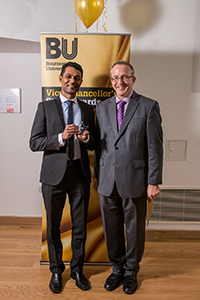A project to report on and catalogue the Indian elections is underway at Bournemouth University.
Project India aims to give an alternate take on the 2014 Indian elections by focussing on voices not always picked up by mainstream media. Work is carried out by a team of students from Bournemouth University (BU), in collaboration with students and staff from other universities in India and the UK.
Stories are written and collated on the Project India website, and students are also encouraged to submit work to the project’s two media partners; rediff.com and WoNoBo.com, both based in India.
The project also seeks to research the traditional and new Medias used by politicians and voters during the elections, to provide in-depth analysis of the part that media has played in the historic election race.
This research will also look at the way politicians present themselves through media and how Indian citizens relate and react to the election through media and social media. Particular attention will be given to how the election is being covered in the margins, and how previously unheard voices in the media will come out through the elections.
Dr Ana Adi, Head of International Development at Bournemouth University and one of the coordinators of the project, said, “We had a wonderful experience with the US 2012 elections where students from Bournemouth University worked together to create coverage of the elections. Using the good practice acquired during the project, and considering our growing interest and number of connections in India, we found it timely to consider a similar project that enabled us to have an alternative look into the Indian Parliamentary Elections.”
Dr Adi continued, “Project India is a great example of international cooperation that brings together education, practice and research. We are proud that the project involves undergraduate and postgraduate students from various degrees, as well as researchers and practicing journalists.”
As a part of the project, students are encouraged to research the latest developments in the election and create unique and interesting multimedia content – often providing an alternative viewpoint of how the elections are affecting the country and how Indian citizens are responding to these political developments.
Stories written so far include a look at how Tibetans living in Delhi are voting in the elections for the first time and how talking about gay rights is still a taboo during the 2014 election race.
The other universities partnering with BU for the project are the University of Madras, Chennai; Amity University, Uttar Pradesh; University of Mumbai, Mumbai; and the University of Bedfordshire.
The project has already received significant interest from the UK and abroad, and is due to be covered by BBC World Service in the coming weeks.
For more information can be found on the Project India website or through social media on Facebook and Twitter.
 Congratulations to Dr Chindu Sreedharan from The Media School on winning the Academic Staff – Unsung Hero Award at the Vice-Chancellor Staff Awards 2014.
Congratulations to Dr Chindu Sreedharan from The Media School on winning the Academic Staff – Unsung Hero Award at the Vice-Chancellor Staff Awards 2014. Bournemouth University
Bournemouth University